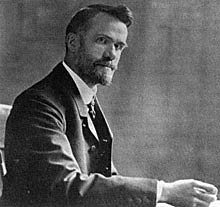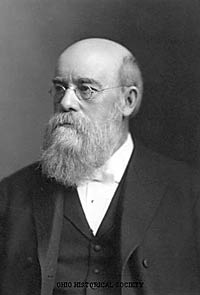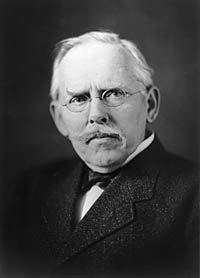Readings:
Psalm 72:12-17
Isaiah 46:8-11
James 2:14-18
Matthew 7:7-12Preface of the Epiphany
[Common of a Prophetic Witness]
[Common of a Saint]
[For All Baptized Christians]
[For Vocation in Daily Work]
[For Labor Day]
[For Rogation Days II]
PRAYER (traditional language)
Loving God, who dost call us to do justice and love kindness: we offer
thanks for the witness of Walter Rauschenbusch, Washington Gladden and
Jacob Riis, reformers of society; and we pray that, following their examples
of faithfulness to the Gospel, we may be ever mindful of the suffering
of those who are poor and work diligently for the reform of our communities;
through Jesus Christ, who with thee and the Holy Spirit livest and reignest,
one God, for ever and ever. Amen.
PRAYER (contemporary language)
Loving God, you call us to do justice and love kindness: we thank you
for the witness of Walter Rauschenbusch, Washington Gladden and Jacob
Riis, reformers of society; and we pray that, following their examples
of faithfulness to the Gospel, we may be ever mindful of the suffering
of those who are poor and work diligently for the reform of our communities;
through Jesus Christ, who with you and the Holy Spirit lives and reigns,
one God, for ever and ever. Amen.
This commemoration appears in A Great Cloud of Witnesses.
Return to Lectionary Home Page
Webmaster: Charles Wohlers
Last updated: 2 May 2020
WALTER RAUSCHENBUSCH, WASHINGTON GLADDEN, and JACOB RIIS
PROPHETIC WITNESSES, 1918, 1918, 1914
 Walter
Rauschenbusch (October 4, 1861 - July 25, 1918) was a Christian
theologian and Baptist minister. He was a key figure in the Social Gospel
movement in the USA.
Walter
Rauschenbusch (October 4, 1861 - July 25, 1918) was a Christian
theologian and Baptist minister. He was a key figure in the Social Gospel
movement in the USA.
Rauschenbusch was born in Upstate New York to a German preacher who taught at the Rochester Theological Seminary. He was raised on the orthodox Protestant doctrines of his time, including biblical literalism and the substitutionary atonement. But when he attended Rochester Theological Seminary, those teachings were challenged. But rather than shaking his faith, these challenges reinforced his faith.
Rauschenbusch's view of Christianity was that its purpose was to spread a Kingdom of God, not through a fire and brimstone style of preaching but by leading a Christlike life. Rauschenbusch did not view Jesus' death as an act of substitutionary atonement but in his words, he died "to substitute love for selfishness as the basis of human society." He wrote that "Christianity is in its nature revolutionary" and tried to remind society of that. He explained that the Kingdom of God "is not a matter of getting individuals to heaven, but of transforming the life on earth into the harmony of heaven."
In Rauschenbusch's early adulthood, mainline Protestant churches were largely allied with the social and political establishment, in effect supporting the domination by robber barons, income disparity, and the use of child labor. Most church leaders did not see a connection between these issues and their ministries, so did nothing to address the suffering. But Rauschenbusch saw it as his duty as a minister and student of Christ to act with love by trying to improve social conditions.
In Christianity and the Social Crisis (1907), Rauschenbusch wrote that " Whoever uncouples the religious and the social life has not understood Jesus. Whoever sets any bounds for the reconstructive power of the religious life over the social relations and institutions of men, to that extent denies the faith of the Master." The significance of this work is that it spoke of the individual's responsibility toward society.
Additionally, Rauschenbusch also wrote:
- Christianizing the Social Order. 1912.
- Dare We Be Christians, 1914.
- Theology for the Social Gospel. 1917.
- Social Principles of Jesus. 1918.
— more at Wikipedia
 Washington
Gladden (February 11, 1836 - July 2, 1918) was a leading American
Congregational church pastor and early leader of the Social Gospel movement.
He was a leading member of the Progressive Movement, serving for two years
as a member of the Columbus (Ohio) City Council and campaigning against
Boss Tweed as acting editor of the New York Independent. Gladden
was probably the first leading U.S. religious figure to support unionization
of the workforce; he also opposed racial segregation.
Washington
Gladden (February 11, 1836 - July 2, 1918) was a leading American
Congregational church pastor and early leader of the Social Gospel movement.
He was a leading member of the Progressive Movement, serving for two years
as a member of the Columbus (Ohio) City Council and campaigning against
Boss Tweed as acting editor of the New York Independent. Gladden
was probably the first leading U.S. religious figure to support unionization
of the workforce; he also opposed racial segregation.
Washington Gladden wrote 40 books during his life. These included:
- Plain Thoughts on the Art of Living 1868
- From the Hub to the Hudson 1869
- Working People and their Employers 1876
- The Young Men & the Churches 1885
- Applied Christianity 1887
- Burning Questions 1890
- Who Wrote the Bible 1891
- The Church & The Kingdom 1894
- Ruling Ideas of the Present Age 1895
- The Christian Pastor and the Working Church 1901
- Social Salvation 1901
- Christianity & Socialism 1905
- Recollections 1909
- The Labor Question 1911
- Present Day Theology 1913
- A Modern Man's Theology 1914
— more at Wikipedia
 Jacob
August Riis (May 3, 1849 - May 26, 1914), was a Danish American
social reformer, muckraking journalist and social documentary photographer.
He is known for his dedication to using his photographic and journalistic
talents to help the impoverished in New York City, which was the subject
of most of his prolific writings and photography. He helped with the implementation
of "model tenements" in New York with the help of humanitarian
Lawrence Veiller. As one of the most prominent exponents of the newly
practicable flash, he is considered a pioneer in photography.
Jacob
August Riis (May 3, 1849 - May 26, 1914), was a Danish American
social reformer, muckraking journalist and social documentary photographer.
He is known for his dedication to using his photographic and journalistic
talents to help the impoverished in New York City, which was the subject
of most of his prolific writings and photography. He helped with the implementation
of "model tenements" in New York with the help of humanitarian
Lawrence Veiller. As one of the most prominent exponents of the newly
practicable flash, he is considered a pioneer in photography.
His books include
- How the Other Half Lives: Studies among the Tenements of New York. 1890. (certainly his most famous work)
- The Children of the Poor. 1892.
- Nibsy's Christmas. 1893. Fiction for younger readers.
- Out of Mulberry Street: Stories of Tenement Life in New York City. 1896.
- A Ten Years' War: An Account of the Battle with the Slum in New York. 1900.
- The Making of an American. 1902.
- The Battle with the Slum. 1901.
- Children of the Tenements. 1903.
- The Peril and the Preservation of the Home: Being the William L. Bull Lectures for the Year 1903.
- Is There a Santa Claus? 1904.
- Theodore Roosevelt, the Citizen. 1904.
- The Old Town. 1909.
- Hero Tales of the Far North. 1910.
- Neighbors: Life Stories of the Other Half. 1914.
— more at Wikipedia